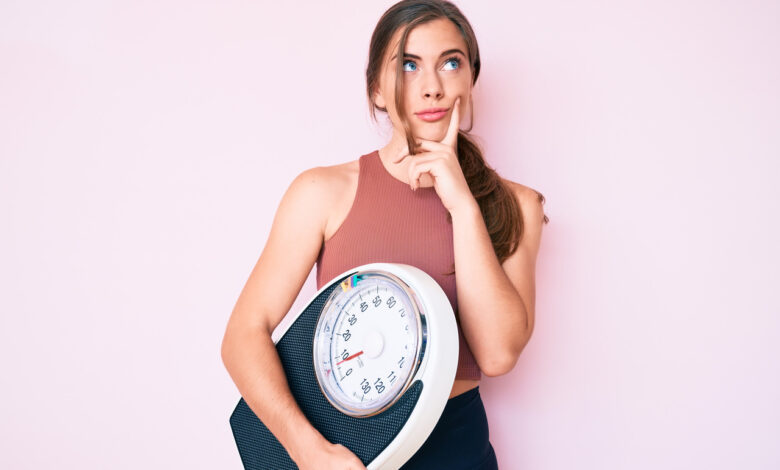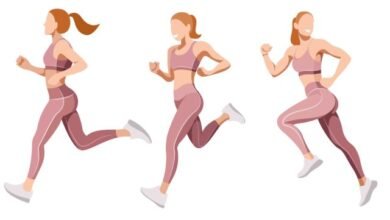Simple Tips on How to Lose Water Weight

Water weight or water retention is common and usually not a cause for concern. It is the body’s way of protecting itself against dehydration. However, feeling puffy or bloated might make you feel uncomfortable.
Depending on your situation, there are a few possible ways to minimise water weight. But the truth is that it’s not possible to get rid of water weight entirely, and you shouldn’t try for it.
Here’s what water weight is, where it comes from, and the steps you can take to shed the extra water.
Understanding Water Weight
Water weight is the term used to describe the extra fluid that gets built up in your tissues, making you feel bloated and swollen. The most common symptom is puffiness in the fingers, wrists, ankles, and stomach.
Water weight can also cause your total body weight to fluctuate by a few pounds in just one day. However, it’s important to remember that water weight does not mean you have gained muscle or fat.
Instead, water weight is usually a temporary condition resulting from a hormonal imbalance, abnormal cortisol levels, pregnancy, menstruation, a salty or carbohydrate-rich diet, or certain medications.
Research suggests that the average person has 2-5 kilos of water weight. However, this number will differ based on age, gender, diet and body composition.
Although excess water weight is not a permanent condition, it can cause discomfort, especially when it leads to stomach bloating. If water weight impacts your quality of life, speak to a doctor for help.
Ways to Lose Water Weight
Different people have different amounts of water weight, determined by factors like health, body size and composition, gender, and lifestyle. So the best way to get rid of water weight is to find out what’s causing it.
Try the below strategies to minimise excess water weight.
Exercise
Moderate to vigorous exercise helps improve your circulation and lymphatic system. It also helps remove any excess water stored in your body.
Additionally, when you exercise, you sweat, which causes a drop in water weight, as well as an increase in blood circulation. To put this into practice, try to go for a walk or jog for at least 30 minutes a day.
Reduce Your Carb Intake
You should eat fewer refined and simple carbs because they cause the body to retain more water. The body stores the excess carbohydrates you eat as glycogen.
Glycogen pulls in water, so the more glycogen you store, the more water you retain. This is the reason why low-carb diets can lead to immediate loss of water weight.
Drink More Water
If you’re trying to reduce water weight, you should stay hydrated. Drinking less water will cause you to retain water and swell up. In addition, staying hydrated will help your body flush out excess sodium through urine.
Reduce Stress
A recent study found that stress causes your body to release the hormone cortisol, which leads to fluid retention and water weight gain. Unfortunately, this hormonal imbalance also affects your appetite, making you crave high-calorie comfort foods that are low in nutritional value.
Natural Diuretics
Urination helps you to lose water weight quickly. Diuretics are compounds that increase urine production. Hence, the intake of natural diuretic sources might be a practical approach. Cranberry juice is one of the best natural diuretic sources.
Increase Potassium Intake
An electrolyte imbalance can cause high blood pressure. Potassium helps regulate electrolytes and fluid balance in the body.
You can increase your potassium intake by eating more fruits and vegetables, including dried fruits, dark green leafy vegetables, pumpkin, oranges, broccoli, watermelon, and coconut water.
Maintain the Magnesium Level
If you want to lose water weight, it’s not just about potassium. Adding magnesium to your diet will also help. Magnesium helps regulate fluid balance in your body.
So eat leafy greens, almonds, beans and avocado to maintain a healthy magnesium level. Also, dandelion supplements reduce water weight by guiding your kidneys to eliminate urine and excess sodium.
Lower the Sodium Level
Consuming too much sodium will cause your body to retain water, and you will gain water weight. To avoid this, limit your intake of sodium-rich foods and drinks.
Enhance Your Sleep Quality
Sleeping for 7 to 9 hours can help regulate sodium and water levels by relaxing the renal nerves in the kidney, preventing the accumulation of excess water weight in your body. So, giving your body adequate time to rest can help reduce excess water weight.
The HealthifyMe Note
To decrease water weight, replace high-sodium foods with low-sodium foods and eat foods rich in electrolytes like potassium and magnesium. However, the speed at which you lose water weight varies depending on the cause. If you suspect you have an underlying health condition.
Conclusion
In conclusion, water weight is usually a temporary problem. Changing your diet and lifestyle may help reduce the discomfort caused by water weight.
Although it may seem counterintuitive, you can also reduce water weight by drinking more water. However, you’ll need medical help if your water weight is due to a chronic health condition.




